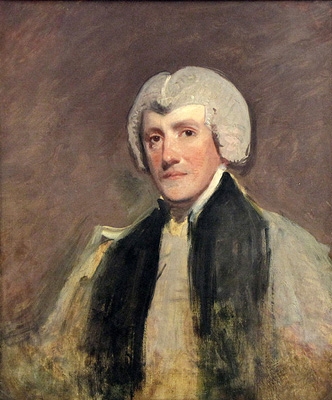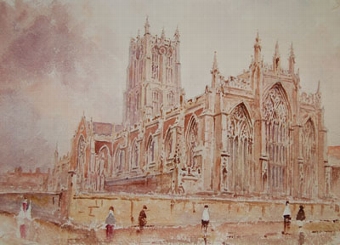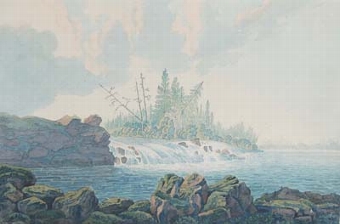Son of William Pitt the Elder, Earl of Chatham, this William Pitt is the youngest prime minister on record, winning the post at the tender age of 24 in 1783. As prime minister he is remembered for his tough policies against corruption, fiscal reform, shifting power toward the House of Commons and the union with Ireland.
Pitt was precocious, entering Cambridge at 14 and Parliament at 22. He was chancellor of the Exchequer in the government of William Petty, Earl of Shelburne (1782-83). The Tories and friends of George III helped him become prime minister.
Unlike his father, Pitt the Younger had a talent for finance. He restructured Britain''s finances, negotiated new tariffs with France and faired well in office until 1793 when France declared war - the beginning of years of conflict. In 1798 the Irish revolted against his policies. His solution, the Act of Union 1800, included Catholic emancipation which was rejected by the king. Pitt resigned in protest in 1801.
Returning as prime minister in 1804, he gained the support of the Austrian, Russian and Swedish leaders in an attempt to defeat Napoleon''s armies. The news of Napoleon''s victory at Austerlitz in 1806 is said to have caused Pitt''s .
William Pitt the Younger was born on 28 May 1759 at Hayes near Bromley in Kent: that year was also the Anno Mirabilis of the Seven Years'' War being conducted by his father, Pitt the Elder. The younger Pitt was the second son and fourth of five children born to William Pitt (the Elder) and his wife Hester Grenville. The younger Pitt''s mother was the sister of George Grenville and Earl Temple; the boy was always the favourite son of Pitt the Elder. His father was created Earl of Chatham in 1766.
Pitt was a fragile, sickly child, with inherited gout. Because of his debilitating ailments, he was taught at home by Rev. Edward Wilson, a Cambridge graduate. The boy was competent in Latin at the age of seven; he had a quick, retentive mind and seems to have been more interested in books than in ''gentlemanly'' sporting activities. His father took a personal interest in his son''s studies, preparing him to excel as an orator by setting him sight and verbal translations of passages from Greek and Latin authors, and hearing him recite. In 1773 he was sent to Pembroke Hall (now College) Cambridge at the age of fourteen, where he studied classics, maths, English history and political philosophy. At University, Pitt worked hard and showed a reserved, aloof and self-controlled character. He graduated with an MA, without examination, in 1776. His father chose Cambridge because, having been educated at Oxford - and hating every moment of it - he did not want his son to go to there.
In 1773 Pitt suffered an attack of gout and Dr. Anthony Addington (father of PM Henry Addington) prescribed a bottle of port a day as the cure. Port is the most toxic of all wines and the prescribed remedy probably exacerbated the problem. Pitt was only fourteen years old but he continued to drink throughout his life. Henry Addington commented ''Mr. Pitt liked a glass of port very well, and a bottle better''.
Whilst he was at university Pitt became friendly with Lord Camden and several other peers, which stood him in good stead when he entered political life. From early 1775 and while still at Cambridge, he often went to hear debates in parliament. Pitt apparently was consciously preparing himself for parliament. On one occasion he was introduced to Charles James Fox: ultimately, the two became sworn political enemies. He was present at his father''s last speech in the House of Lords on 7 April 1778, and helped to carry the earl from the chamber.
On 11 May 1778 the Earl of Chatham died leaving his son an income of less than ?3,000 a year; in the same year Pitt entered Lincoln?s Inn to study law. He ran into debt and stayed that way until his death. He was called to the Bar in June 1780 and joined the Western Circuit. He also stood as candidate for Cambridge University in the 1780 General Election and came last in the poll out of five candidates, but secured 14% of the total votes cast. Pitt began canvassing patrons for a seat in parliament and in November 1780 he was offered Appleby by Sir James Lowther, through influence of Duke of Rutland who was a university friend of Pitt. In January 1781, at the age of 21, Pitt took his seat in the House of Commons. Samuel Goodenough, an MP, said in February 1781, ''The famous William Pitt, who made so capital a figure in the last reign, is restored to us? and Edmund Burke commented: ?He?s not a chip off the old block; it?s the old block itself?. Pitt attached himself to Shelburne?s group - naturally enough, since this was his father''s political following.
Pitt''s maiden speech supported Burke?s Bill of Oeconomical Reform. Pitt was called on by MPs to speak with no warning and no chance to prepare; he stood up and demonstrated his oratorical ability. Pitt had a rich voice and was an effective speaker: cool, incisive and a master of reasoned argument. He was rarely emotive but was a very impressive speaker who used a wide vocabulary. For example, when speaking of the American War, he called it ''most accursed, wicked, barbarous, cruel, unnatural, unjust and diabolical''. Pitt was most concerned about the American War and in 1782 he moved for a Select Committee to consider a reform of parliament with the intention of consolidating middle-class power and restricting the influence of Crown; the motion was defeated. He spoke rarely until 1783 when he became PM and he refused ?minor office? under Rockingham. Pitt was influenced by Shelburne and was never a democrat. He also had powerful friends.
Pitt was appointed Chancellor of Exchequer at the age of twenty-four by Shelburne in July 1783. Pitt knew little about his new duties and less about practical business of government, although he was in all but name leader of the Government in the Commons. There were only three commoners in Shelburne?s Government and the Ministry was insecure because Shelburne could not command a majority despite having royal support. In 1783 Shelburne resigned following a concentrated onslaught from Lord North and Charles James Fox and their supporters. Pitt declined to form a government and also resigned. Many of Pitt?s later economic measures carried out Shelburne?s policies although Pitt gave scant recognition to Shelburne.
On 12 September 1783 he went to France with William Wilberforce and Edward Eliot, the only visit that he made to the continent. He stayed some time at Rheims, where he met Talleyrand and on 9 October he went to Paris and Fontainebleau. He returned to England on 24 October and took up residence in his brother''s house in Berkeley Square, intending to resume his legal work.
The Fox-North coalition, under the nominal leadership of the Duke of Portland, survived only until December 1783 when George III successfully undermined the ministry. On 19 December Pitt accepted the post of PM at the age of 24. His ministry was hailed as a ''mince-pie'' administration and it was not expected to last much beyond Christmas. This first ministry survived until 14 March 1801. However, Pitt spent the first month as PM fending off attacks in parliament from Fox, suffering a number of defeats in the process.
In February 1784 Pitt was made a Freeman of the City of London. As he returned from the ceremony his carriage was attacked opposite Brooks''s, the club frequented by his opponents, and he escaped with difficulty. This outrage caused much indignation against the opposition politicians and Fox''s majority sank to twelve on 1 March. The following month Pitt won a general election to retain his position as PM and also won one of the seats for Cambridge University, a constituency that he represented for the rest of his life.
On Pitt''s advice, Wilberforce took up the slave-trade question; Wilberforce was ill on 9 May 1788 so Pitt brought forward the resolution for him. It was supported by Fox and Burke and was carried. In 1790 the king pressed Pitt to accept the Order of the Garter but he declined, requesting that it might be conferred on his brother, Lord Chatham, instead. However, in August 1792 and at the king''s request he accepted the wardenship of the Cinque ports, which was worth about ?3,000 a year. In the autumn of 1785 he had bought Holwood, an estate near Bromley, Kent, which put him further into debt. He took delight in the place and loved to improve it but his affairs fell into disorder. He neglected them and his servants robbed him.
Pitt''s premiership in peacetime lasted from 1783 until 1789 when the French Revolution occurred. During that period he rescued the nation''s financed from the brink of disaster but that work was undone by the lengthy French Wars that began in 1793. Some of the work done by Pitt''s ministry included.
Antiques.co.uk Ref: WVQ4D2HV
- Materials:
- Oil on Canvas
- Width (cm):
- 86.36 x 71.2, (34 x 28ins)












